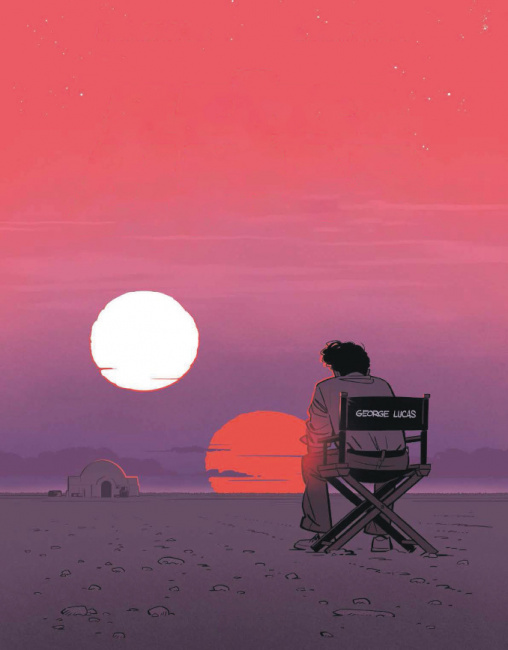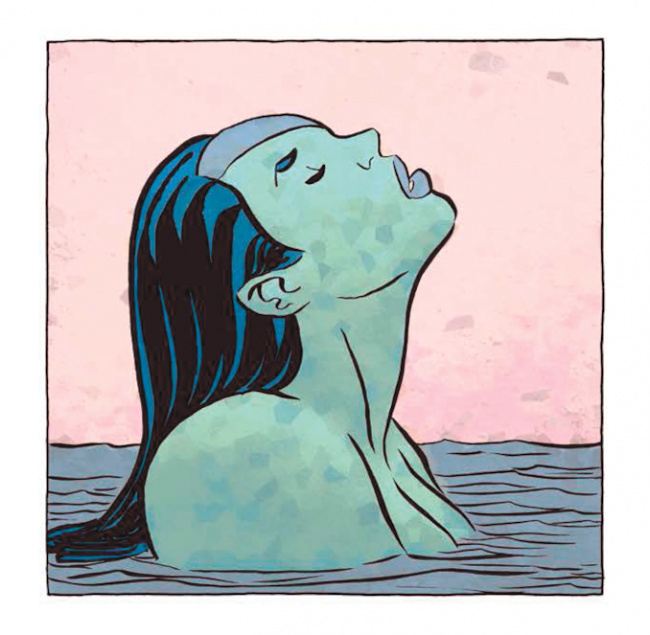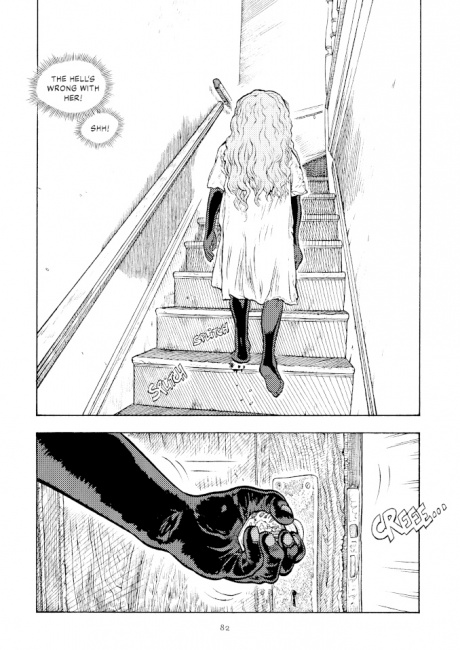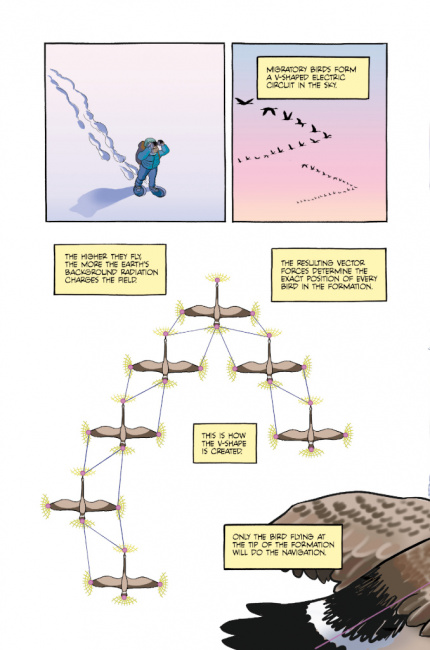We sat down with Vice President, Executive Editorial & Creative Director First Second Books and 23rd St. Books Mark Siegel to talk about their new adult imprint, the market, key 2025 titles, New Scott McCloud, and more.
ICv2: We’re talking to Mark Siegel about the bifurcation of the First Second lines into kids and adult imprints (see “First Second Launches Sister Imprint“). What was the breakdown between kids and adults in the line as it existed before the division?
Mark Siegel: There was the dream of First Second to begin with, the ideal version of it, which was, in my mind, always going to be a third young readers, a third teen and a third adult.
Now, I knew nothing about American publishing when we started, and I knew nothing about the importance of age categories in the whole system and the way it’s set up. It’s interesting: foreign editors joke about American editors. They’re like, “You guys are just obsessed with age categories, that’s all you ever talk about,” and it’s because I think the selling of books has become so siloed and it’s a different game, different reviews, channels, everything.
Anyway, my dream for this house was that we would cover all ages, so we would span a lifetime of reading.
Very European.
Very European, very Tintin, right? As we got started, we quickly got this hit with American Born Chinese, so suddenly it was like in YA. It was the YA librarians that basically vaulted us into a very rapid visibility because of the Printz Award and then the National Book Award.
But you know how it is. The pressures of business are usually, if something works, “Do more of that and drop everything else,” and I was determined not to do that. And then as the years went on, we had more hits in young readers and then some real hits in the really young readers, middle grade readers. And then occasional successes, I wouldn’t call them hits, but some good working books in adult until The Adventure Zone, which still to this day is a runaway success and it’s adult.
Even a lot of people who follow First Second aren’t aware that we have adult titles. They think we’re just young readers. That’s been bothering me over the years, because I want us to be able to champion our adult projects with the same punch, and the same clout as we do in young readers.
It’s become clear that it doesn’t operate the same way, and you need to be specialized; your marketing has to be specialized. That’s true in the direct market; it’s true in the book trade; it’s true in the institutional, the libraries and even the school stuff. When it comes to adult, it’s all different. Some of the stuff that works great for younger readers does not apply in adult. It needs a little bit more of this specialized approach and a unique strategy.
It’s been brewing in my mind, and it’s been a subject of many conversations internally with Macmillan, with the team, the First Second team.
Every so often, we would put out what I consider a really successful book, a nonfiction, like we did the Putin biography, Accidental Czar, and the dictatorship book [Dictatorship: It’s Easier Than You Think!]. They’re meaty, heavy subjects, but they were done with humor and really good and really legit substance, incredible reviews, and we don’t seem to get a tenth of the numbers we could get if this was in middle grade. With that kind of exposure, it should have done much better. It became a kind of a challenge to ourselves like, “How do we crack this nut?”
I think after many conversations and exploring different possible approaches, it became clear: it needs its own brand, it needs to have a distinct identity. It’s still going to be two sides of the same coin and very much working in tandem, but it’s going to be tackling that market. It’s more than one market, it’s many markets, but tackling that readership, that audience separately.
Of your backlist, what percentage is going to 23rd Street versus staying with First Second?
In terms of adult books that are still in print, it’s a pretty small percentage. It might be 10 or 15 percent of our entire backlist, something like that. I know there’s maybe 20 or 25 prominent titles that I feel are our most active backlist right now in adults, which is not a lot compared to the volume we have in young readers.
We do have quite a few adult titles in the pipeline already that were slated for First Second that are now going to be under 23rd Street.
If it was that small a percentage, 23rd Street is really a growth initiative. You’re trying to expand adult?
Exactly. It’s an interesting thing somebody asked me, “Are you repositioning?” I was like, “No, this is a growth.” First Second is doing well. We are a feather in the Macmillan cap. The fact that there’s the trust to take a fresh new gamble is based on the fact that First Second is looking pretty good.
Tell us where you see the adult graphic novel market, since that’s the growth area. Why do you feel that that’s a space that needs more books?
I do feel it’s a space that needs more books. I think we’re going to take a unique approach just like we did with First Second. Part of it is looking at the existing markets, and part of it is looking to shape the market and bring new readers to graphic novels.
We played a part in shaping the landscape of children’s graphic novels; it’s a little bit a similar ambition. It’s interesting that I’ve been talking to a lot of people in animation and right now I keep hearing the great white space is adult animation, and not like BoJack Horseman, but actually adult dramatic animation. People who don’t normally watch animation.
There’s a country in the world where there’s a lot of that.
[laughs] France. It’s interesting that you…
No, I was talking about Japan.
You’re right. That’s actually number one is a huge market for adult animation and adult manga, but in France you see like Blue Eye Samurai or Arcane, these unexpected, out-of-the-blue hits.
Inside Out‘s the biggest movie of year.
Right, and it’s not just kids. That’s telling us something. Also, if you look at our part of the comics industry, and you look at Raina Telgemeier, or in our case, the Friends series (Shannon Hale and LeUyen Pham), the first wave of those readers are now starting families, and entering the professional world, and they’re the adults.
It’s not just who’s out there now, there’s a large, growing body of people for whom comics is just part of their reading diet. Some are fans and some aren’t, but they still definitely have some graphic novels on their bookshelf.
If you think about the obvious big hits, many times the ones that broke out of the ghetto and reached and connected with people, including a large audience that doesn’t normally read comics, it’s because it’s a voice and it’s a resonant thing, whether it’s like Iran when it was Persepolis having its moment or March.
What are your plans in terms of number of releases for your new imprint?
We’re starting with around 12 to 15 a year. Compared to our 50 in First Second, it’s not on the same scale yet, but we want to curate this carefully.
Oftentimes in publishing, there’s the bandwagon of the trend of the moment. By the time you see it, it’s already old, so I want to be careful. When you’re in editorial, you receive a lot of certain kinds of things. There’s a lot of certain kinds of memoirs, or maybe certain genres, certain maybe precious fantasy for young readers. Usually because there’s one or two really good ones, and then it’s become a little school that people follow.
I’m trying not to do that. I feel the model for First Second was much more to focus on great voices and authors we want to champion over the long run. In general, we’re not thinking too short‑term, and I have the advantage of Macmillan, which is, privately owned. It’s one of the Big Five, but it’s the only one that’s not a corporation. I feel like that has served us really well in terms of being able to play a longer game and not be just beholden to this quarter.
We’ve had ups and downs, but then at a certain point, that long game really started paying off on a curve that’s just going steady and set up for long‑term success.
Is First Second going to maintain its current output, or are they also going up?
For now, there’s a lot in the pipeline and it could be that in the next couple of years we go up a bit, but there’s no real plans for beefing that up. Also, moving the adult piece out means we’re going to be able to fill out those young categories and try new things.
Always our favorite part of the conversation. Tell us what you’re most excited about coming up over the next 18 months or so?
2025 is our launch list for 23rd Street, and there’s some really juicy goodies. Just like every year I hope First Second has some totally surprising offerings, same thing with 23rd Street. Defying expectations is a sign of a healthy editorial philosophy.
There’s a couple things coming from France, but one that’s very exciting is Lucas Wars It’s this George Lucas biography that has been a huge hit in France. You know how sometimes biopics can feel a bit stiff and wooden and a bit stale, and this is not that. It’s like the first time you saw Rocky; it’s this rousing underdog story that I didn’t think I would find in reading about the making of the first Star Wars movie, and it’s great.
There’s all kinds of little anecdotes; and the artwork is very expressive, but also you recognize all the players (the actors, but also the other directors like Spielberg and Coppola), and they’re all around. It’s great. It’s actually amazingly done and it puts you there, and I think it’s not just a nostalgia thing, it’s just a really good story.
Then we have Jesse Lonergan, who’s this prodigy. It was pretty much almost complete when we saw it, this project called Drome. If I were to describe him in the Hollywood pitch, he’s like Moebius meets Chris Ware (which is not something you ever expected to see in your lifetime), but he’s got this incredible formal sense of comics and this epic fantasy drawing loosely off of the Epic of Gilgamesh, but it’s high fantasy and it’s really good.
Some other amazing stuff, a very eclectic mix. We have Antoine Revoy’s The Harrowing Game, which is totally for the fans of Junji Ito, horror manga inflected. It’s nightmarish, but also amazing.
Our list is not just for one reader; it’s really meant to tap into all different audiences.
Also some nonfiction. There’s a very exciting book about electromagnetism called Electric Life, and it touches on electromagnetism in everything from bacteria to bees, to whales, to humans, to planets and galaxies, and it’s pretty mind‑blowing stuff.
A little further down the road, there’s also some very exciting projects in adults. Scott McCloud’s magnum opus is coming, on visual literacy, which is absolutely like a leap to a whole new level. It applies to design, every kind of visual design. It’s great. I don’t want to say the title yet because it could change. [laughs] Just in case.
Is that coming out next year?
If we can, yeah. It might be ’26, but it’s OK.
Gene Yang is working on an adult project. Ben Hatke is working on an adult project. There’s a lot of exciting stuff already in the pipeline.
What’s your thought on the nature of the adult market that you’re coming into? We went through COVID, there was a surge, especially in kids graphic novel sales but adult too. What’s your feel about where the market is now and 23rd Street’s place in it?
That’s a great question. It’s a little shapeless around the edges, because there’s certain things that are hitting in the adult market in very different ways.
You’ve got the literary graphic novel, if you take a Kate Beaton or some of the works like that. That’s one kind of graphic novel, and it has its own channels and markets that it belongs in more than say, Saga.
With The Adventure Zone, it would be very hard to replicate that success because it’s a very, very passionate, loyal fan base that also happens to be very compatible with comics. We’ve done experiments where a fan base wouldn’t migrate to graphic novels, and you’re like, you’re stuck with someone with a big platform and just no interest in comics. The reason I mentioned that is that I think that the adult market is much more… what’s the word I’m looking for? It’s fragmented and it’s granular right now.
I hope that we can, with a solid brand, make clumps of those granules, but right now, it’s very dispersed. We’re definitely not in the days of Oprah makes a book or Jon Stewart makes a book. Those days are gone.
Now you’re talking about influencers and you’re talking about working through social media, working through a variety of things. If you can get enough of this granular multi‑pronged attention, it can add up into a hit, but it’s less monolithic. I feel like in a way with children’s, the librarians, with an award, can make a boo; and if you get a pre‑order campaign on Amazon that can make a book. With adult, we’re going to have to figure out how to find people, how to let people know when we have something good.
Click Gallery below for previews of 2025 releases!
Source: ICV2









